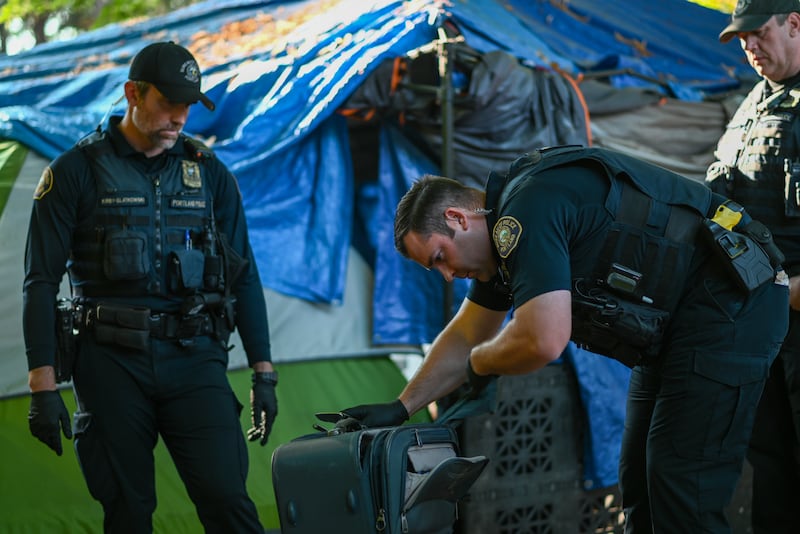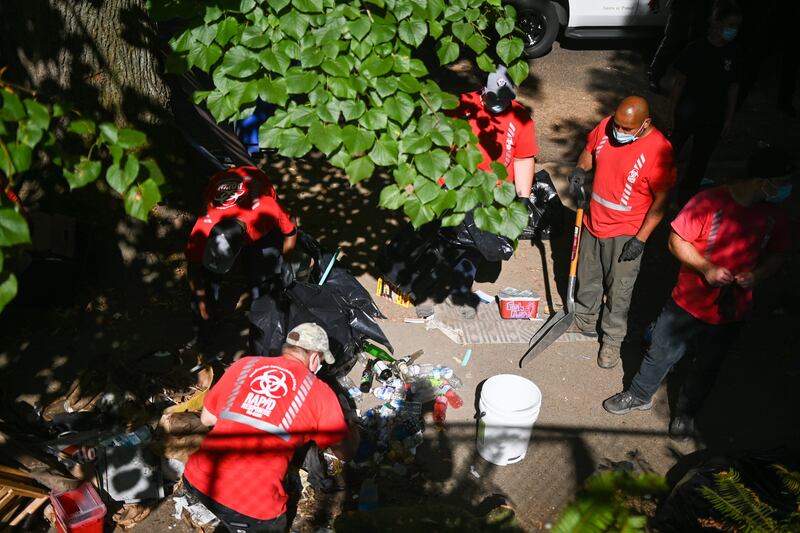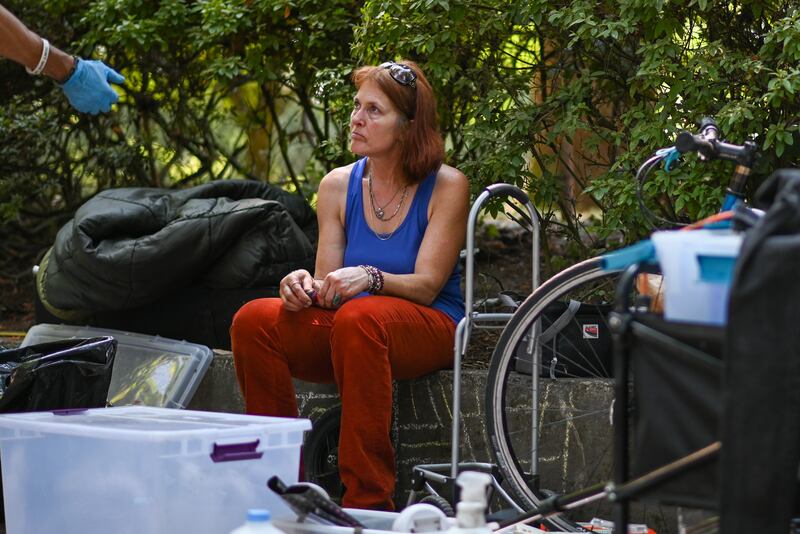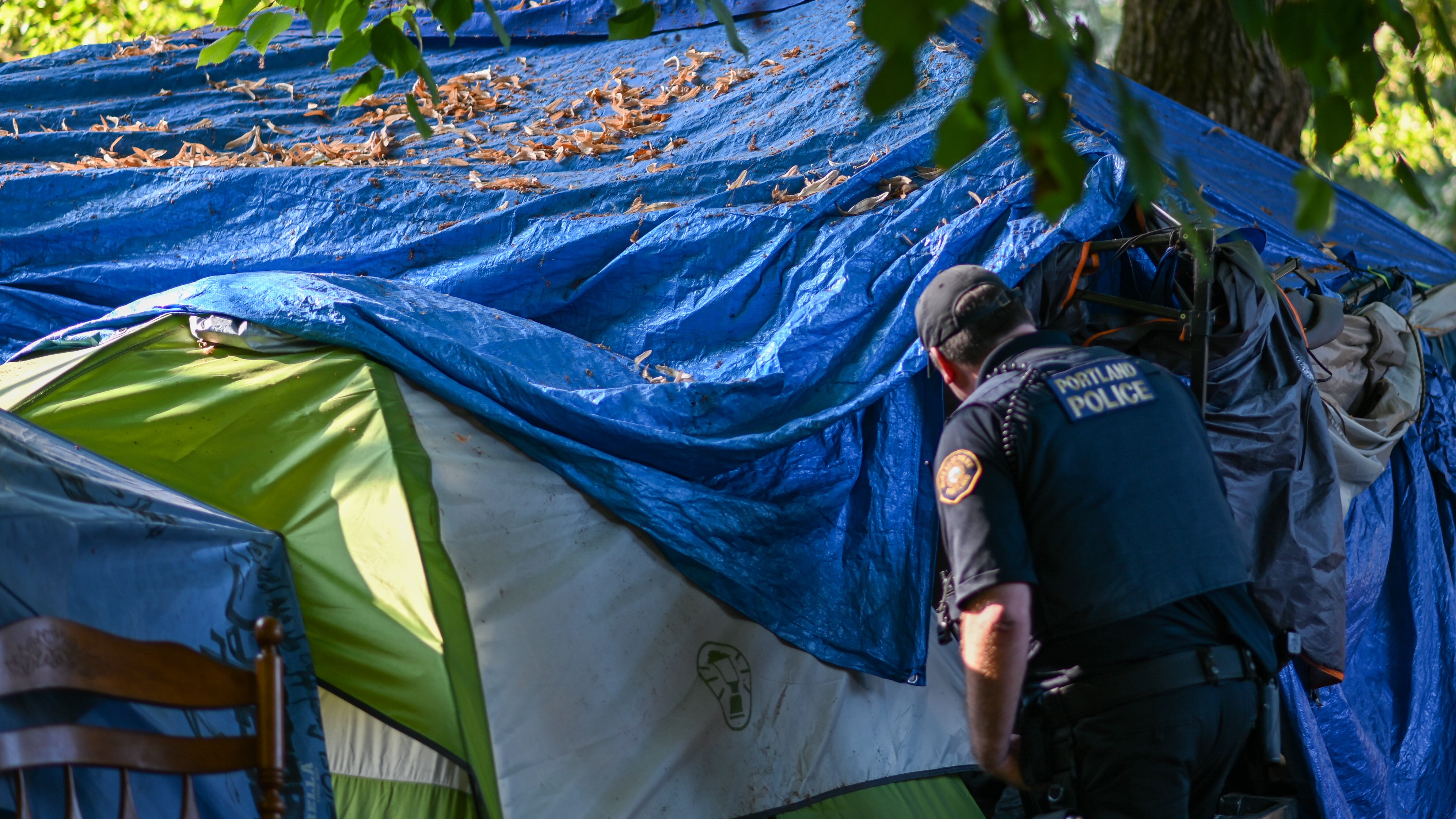On Thursday morning, a summerlong saga of poverty in an upscale Portland neighborhood came to an end, as around 50 campers in the Laurelhurst Park encampment were met by the city’s team that sweeps homeless camps.
The sweep started just after 8 am, when four Portland Police Bureau squad cars arrived and parked along Southeast Oak Street. Rapid Response Bioclean, the city’s contractor that helps with sweeps, approached on 37th Avenue. About 50 red shirt-clad Rapid Response employees showed up.
The sweep was marked by little visible controversy; while a small number of protesters trickled in and out, the conflict never escalated beyond verbal heckling of cops.
It was a solemn, laborious process. By 10 am, only about a third of people’s belongings had been removed.
At 10 am, police set up a cordon at the intersection of Oak and 37th. They proceeded to move the cordon in half-block increments to allow Bioclean to work undeterred, shifting the cordon as each section was cleaned.
Campers seemed largely resigned to the move, saying little. Stop the Sweeps PDX, an advocacy group, helped campers move their belongings as morning became afternoon. More and more volunteers continued to trickle in to aid the effort.
“There’s a lot of people at Laurelhurst, and it takes a really long time to pack up your whole life and move somewhere,” explained a member who did not want to disclose her name for privacy reasons. “So we have volunteers here who are helping people pick up stuff, with their consent, of course.”
About 20 police officers were on the scene, largely hanging back, observing and talking among themselves. On occasion, cops looked in suitcases for firearms.

A group of about 20 protesters heckled the cops, chanting, “All cops are bastards!” and calling individual officers racist, while other protesters and volunteers helped campers pack up their belongings.
One protester was arrested by Portland police for disturbing the yellow police cordon tape as fellow protesters continued to chant. An apple sailed across the yellow police line, hitting a Portland police squad car.
“Zach Delong is a piece of shit!” one protester yelled, referring to the Portland police officer who shot and killed a man in Lents Park earlier this year.
“Yeah, he is,” an officer responded with a chuckle. “I’ll text him that right now.”

On at least two prior occasions, activists successfully deterred planned sweeps of the camp, which grew along the south edge of one of Portland’s most iconic parks. But the Portland City Council unanimously declared this week that the camp must leave, saying its residents had brandished weapons and dumped human waste in the residential neighborhood.
The growing Laurelhurst camp has been a high-profile example of the civic debate over how best to address homelessness and camps that grow into sidewalk compounds. The camp was swept last fall but was reoccupied this spring, escalated by conflict between increasingly exasperated neighbors, city contractors and campers.
The sweep came a day after the family of Debby Ann Beaver, a homeless woman who died one week after a Rapid Response Bioclean team allegedly seized her medications during a similar sweep in 2019, filed paperwork to initiate a wrongful death lawsuit against the city contractor.
Michael Fuller, the attorney representing Beaver’s family in the case, asked yesterday that the city hold off on the Laurelhurst sweep until an investigation was launched into the case.
That didn’t happen.

Nan Bobernac is a Laurelhurst neighborhood local who came to protest the sweep today. She often takes walks through the park and has seen the camp fluctuate in size throughout the past year.
“I’m heartbroken to see another sweep going on in Portland instead of the real solution,” the self-described “senior activist” explained. “I’ve seen this camp come and go because I love to walk in Laurelhurst Park. I’m willing to make a bet that within a short amount of time all this camp will be back.”
Bobernac, like many other protesters here, feels such sweeps harm the houseless community without offering long-term solutions to address the problem.
“I’m very disappointed in our City Council and our mayor’s tactics once again,” Bobernac said.
By noon on Thursday, Rapid Response was still clearing the camp.
